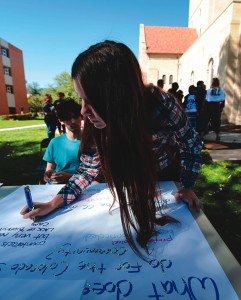
Students gathered at the Community Kitchen at Shove Chapel on Oct. 5 to express their concerns about changes at the kitchen. The event allowed students, faculty, staff, and community members to voice their opinions. Photo by Bryan Oller.
Safety concerns and reduced, inconsistent student involvement prompted Colorado College President Jill Tiefenthaler to ask Associate Dean Mike Siddoway, who oversees the college’s Collaborative for Community Engagement, to study the CC Community Kitchen and assess its operations.
Siddoway, who has volunteered in soup kitchens in Colorado Springs and other cities for more than 40 years, noted that the kitchen’s operations were out of step with best practices, which include an educational orientation for guests and volunteers, an educational programming component, guest screening for safety issues, and a code of conduct.
Although most CC Community Kitchen guests were respectful of the campus community and CC property, there had been recent incidents involving drugs, unleashed dogs, sexual harassment, and stalking. Siddoway also noted that the campus chapel was not an ideal space for the kitchen, as the building regularly sustained damage.
David Harker, newly appointed director of the Collaborative for Community Engagement, said issues of security, integrity of the building, and the nature of the community kitchen are now being addressed. Meals are continuing for those who choose to participate in a programming component and dialogue is now underway to determine an eventual new location.
New to the kitchen beginning in mid-November: a registration process for all participants — volunteers, students, and guests — providing accountability; a planned meal focused on the nutritional needs of those living without homes and in poverty; and a co-curricular program addressing the root causes of hunger and homelessness.
“We are providing that meal and the nutrition component, and shifting the focus to community learning,” Harker said. The shift also includes training for volunteers, a more structured format, and developing a code of conduct.
Students are working with the college’s Innovation Institute to develop ways to have a larger and more lasting impact. An additional $20,000 was made available to fund social innovation projects and address homelessness and hunger in Colorado Springs.
New and potential partnerships in the community will be identified so students may continue to work on these issues and engage in purposeful ways with those who are homeless, hungry, and impoverished.
The CC Community Kitchen was started 22 years ago.